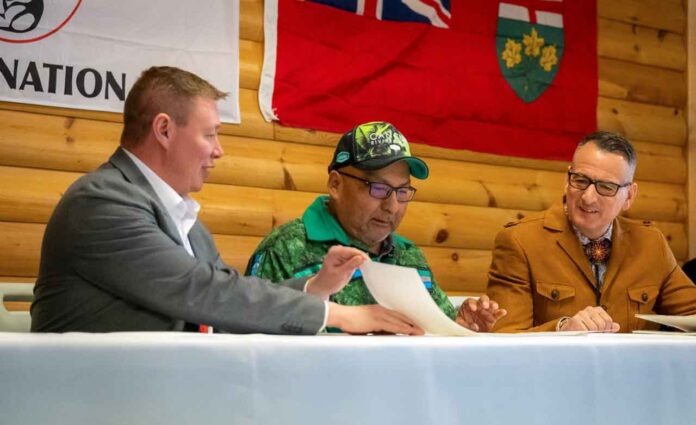
Naicatchewenin First Nation, Treaty 3 Territory, Ontario — A landmark compensation agreement has been reached involving the Naicatchewenin First Nation, Crown-Indigenous Relations and Northern Affairs Canada, and the Ontario Ministry of Indigenous Affairs, addressing historical flooding damages.
Historic Flooding Issue Resolved
The Government of Canada and the Province of Ontario have announced a significant compensation settlement to address a century-old grievance.
The Naicatchewenin First Nation will receive $21,815,877 for damages sustained from the 1905 construction of the Fort Frances–International Falls Dam. The flooding from this dam continues to affect their reserve lands to this day, highlighting a longstanding issue of historical injustice.
Leaders Speak on Reconciliation Efforts
Chief Wayne Smith of the Naicatchewenin First Nation acknowledged the persistent efforts of both past and present leadership in securing what he terms “fair compensation” for the damages incurred.
“I would like to acknowledge the hard work and determination put forth by the present and past Leadership of Naicatchewenin First Nation, along with the technicians in achieving what we believe to be fair compensation for the historical damage created by the building of the Fort Frances-International Falls Dam in 1905, which flooded our traditional lands.
The Government’s efforts in honouring their legal obligation is a positive step towards addressing historical wrongs and advancing reconciliation with our Nation.
We cannot compensate the ancestors who physically and mentally experienced the effects of this original action, but we will continue to invest in our Youth, Elders and Band members in the constant effort of making better lives for the people of our Nation,” stated Chief Wayne Smith
Jaime Battiste, Parliamentary Secretary to the Minister of Crown-Indigenous Relations, and the Honourable Greg Rickford, Ontario Minister of Indigenous Affairs, have both reiterated their commitment to advancing reconciliation and renewing relationships with Indigenous communities.
“Ontario is proud to work in partnership with Naicatchewenin and other First Nation communities as we advance reconciliation, strengthen relationships and build Ontario together. The agreement, achieved through fair, respectful and meaningful negotiation, will enhance the social and economic well-being of the community and bring greater prosperity to the surrounding region,” stated Greg Rickford Ontario’s Minister of Indigenous Affairs and Member of Provincial Parliament for Kenora–Rainy River.
Community Impact and Future Steps This settlement is seen as a step towards mending the relationship with the Naicatchewenin First Nation and honoring legal obligations. The funds will support ongoing community development, benefiting youth, elders, and band members, thereby fostering a brighter future for the Nation.
Quick Facts
- Naicatchewenin First Nation is situated on Rainy Lake, approximately 60 kilometers northwest of Fort Frances, Ontario, and has about 600 members.
- The flooding claim was initially submitted in 1996 and has undergone extensive negotiations since then, culminating in a ratified settlement agreement in late 2023.
- This settlement is part of a broader effort by the Canadian government, which has resolved 297 claims with nearly $11.1 billion in compensation from 2016 to 2024.
This resolution not only addresses past injustices but also lays the groundwork for more inclusive and respectful relations moving forward, ensuring that the Naicatchewenin First Nation and its people can thrive.






